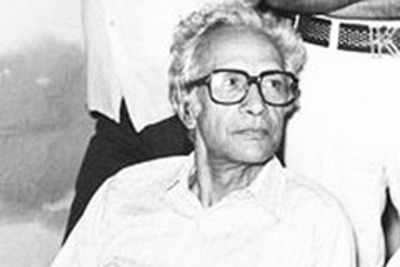- News
- entertainment
- hindi
- bollywood
- Amit Khanna: Chetan Anand was one of our most under-rated filmmakers
Trending
This story is from October 14, 2015
Amit Khanna: Chetan Anand was one of our most under-rated filmmakers
Kasauli: For Heer Ranjha (1970), Hindi cinema’s first film in verse, director Chetan Anand wanted a scene bathed in yellow.

Kasauli: For Heer Ranjha (1970), Hindi cinema’s first film in verse, director Chetan Anand wanted a scene bathed in yellow.
“He paid a farmer in advance asking him to sow only mustard seeds to get the effect,” recalled lyricist and script-writer Amit Khanna, who has worked with and known the Anand family for decades.
Chetan, the eldest of the three Anand brothers, Dev and Vijay being the other two, belonged to the black and white generation of movie makers but had a highly evolved sense of colour.In Heer Ranjha, the screen is filled with ecstatic pinks when love blooms between Heer and Ranjha, goes searing red during marriage and turns all black as a symbol of defeated, tragic love.
“The film’s colour scheme was planned a year in advance. It was like story boarding,” said his son Ketan Anand at a discussion titled, Chetan Anand 100 years, at the Khushwant Singh literary festival. Like the writer-editor-historian, after whom the festival is named, Chetan, too, was born in 1915. Interestingly, both went to the same college in Lahore.
Sohaila Kapur, niece of Chetan Anand, remembers him as a “handsome man with twinkling and expressive eyes” inimitable of the Anand family. In his autobiography, Truth, love and a little malice, Khushwant Singh describes Chetan as “fair, girlish-looking with curly hair and dreamy eyes.”
Chetan worked for the BBC and taught both literature and tennis – which he also played with Khushwant in their college days – at Doon School. Amit Khanna recalled that during his teaching days Chetan wrote a script based on the life of Emperor Ashoka. It was titled Kundan and he showed it to the illustrious Phani Mazumdar. “He did not use the script; instead he offered him the leading role in a film, Rajkumar,” says Amit Khanna. The film isn’t mentioned in Encyclopaedia of Indian Cinema or elsewhere. Probably it never saw the light of day. But Chetan later essayed character roles in movies such as Kala Bazaar and Aman.
The two elder Anand brothers, Chetan and Dev, joined hands to set up Navketan, the family film banner partly named after Chetan’s son, Ketan, who has made a documentary on his father’s life and work, The Poetics of Film.
The first film under the new banner, Afsar (1950), was based on Russian playwright Nikolai Gogol’s play, The Inspector General. The movie, which starred Dev Anand’s (then) lady love Suraiya in the female lead, didn’t send the distributors laughing to the bank. Neither did the award-winning Aandhiyan, which earned an award at Venice.
Chetan was despondent. But his finest directorial moment for Navketan came when Taxi Driver, shot on the streets of Mumbai over 27 days, partly with a hand-held camera, pulled the company out of dire straits. “Taxi Driver became a super hit and drove home an old truth that big money does not necessarily make a big film,’ wrote Dev Anand in his autobiography, Romancing With Life.
But the two brothers split and Chetan founded his own company, Himalaya Films, in 1960.
For latest Bollywood updates follow us on Twitter >>> @TOIEntertain
For the latest in Bollywood news, like us on Facebook >>> TOIEntertain
For more interesting Bollywood news and pictures follow us on Pinterest>>> timesofindia
For latest Bollywood updates follow us on G+ >>> The Times of India Entertainment
WATCH: Chetan Anand - Director - Biography
“He paid a farmer in advance asking him to sow only mustard seeds to get the effect,” recalled lyricist and script-writer Amit Khanna, who has worked with and known the Anand family for decades.
Chetan, the eldest of the three Anand brothers, Dev and Vijay being the other two, belonged to the black and white generation of movie makers but had a highly evolved sense of colour.In Heer Ranjha, the screen is filled with ecstatic pinks when love blooms between Heer and Ranjha, goes searing red during marriage and turns all black as a symbol of defeated, tragic love.
“The film’s colour scheme was planned a year in advance. It was like story boarding,” said his son Ketan Anand at a discussion titled, Chetan Anand 100 years, at the Khushwant Singh literary festival. Like the writer-editor-historian, after whom the festival is named, Chetan, too, was born in 1915. Interestingly, both went to the same college in Lahore.
Chetan also made Haqeeqat two years after the China war debacle, the first Hindi movie that took a realistic look at war. In 1946, his debut directorial venture, Neecha Nagar (1946) earned accolades at Cannes. His other notable films include Aandhiyan, Taxi Driver, Hanste Zakhm and Kudrat. And Aakhri Khat (1966), an indigenous Baby’s Day Out, was Rajesh Khanna’s first release. For his ouvre, Amit Khanna feels “he is one of the most underrated filmmakers of our country.”
Sohaila Kapur, niece of Chetan Anand, remembers him as a “handsome man with twinkling and expressive eyes” inimitable of the Anand family. In his autobiography, Truth, love and a little malice, Khushwant Singh describes Chetan as “fair, girlish-looking with curly hair and dreamy eyes.”
Chetan worked for the BBC and taught both literature and tennis – which he also played with Khushwant in their college days – at Doon School. Amit Khanna recalled that during his teaching days Chetan wrote a script based on the life of Emperor Ashoka. It was titled Kundan and he showed it to the illustrious Phani Mazumdar. “He did not use the script; instead he offered him the leading role in a film, Rajkumar,” says Amit Khanna. The film isn’t mentioned in Encyclopaedia of Indian Cinema or elsewhere. Probably it never saw the light of day. But Chetan later essayed character roles in movies such as Kala Bazaar and Aman.
The two elder Anand brothers, Chetan and Dev, joined hands to set up Navketan, the family film banner partly named after Chetan’s son, Ketan, who has made a documentary on his father’s life and work, The Poetics of Film.
The first film under the new banner, Afsar (1950), was based on Russian playwright Nikolai Gogol’s play, The Inspector General. The movie, which starred Dev Anand’s (then) lady love Suraiya in the female lead, didn’t send the distributors laughing to the bank. Neither did the award-winning Aandhiyan, which earned an award at Venice.
Chetan was despondent. But his finest directorial moment for Navketan came when Taxi Driver, shot on the streets of Mumbai over 27 days, partly with a hand-held camera, pulled the company out of dire straits. “Taxi Driver became a super hit and drove home an old truth that big money does not necessarily make a big film,’ wrote Dev Anand in his autobiography, Romancing With Life.
But the two brothers split and Chetan founded his own company, Himalaya Films, in 1960.
For latest Bollywood updates follow us on Twitter >>> @TOIEntertain
For the latest in Bollywood news, like us on Facebook >>> TOIEntertain
For more interesting Bollywood news and pictures follow us on Pinterest>>> timesofindia
For latest Bollywood updates follow us on G+ >>> The Times of India Entertainment
WATCH: Chetan Anand - Director - Biography
End of Article
FOLLOW US ON SOCIAL MEDIA









